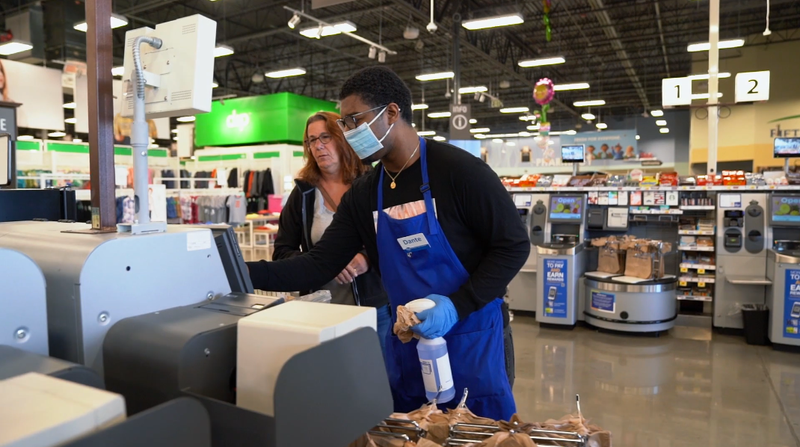Kroger to migrate all Our Brands products to sustainable packagingKroger to migrate all Our Brands products to sustainable packaging
Higher investment in minority- and women-owned business also spotlighted in 2020 ESG Report
August 17, 2020

The Kroger Co. unveiled a new sustainable packaging commitment for its Our Brands private-label portfolio, increased investment in minority- and women-owned businesses and reduced retail food waste in releasing its 2020 Environmental, Social and Governance (ESG) Report.
Cincinnati-based Kroger said Monday in this year's ESG Report that it aims to achieve 100% recyclable, compostable and/or reusable packaging for all Our Brands products by 2030. To that end, the company will complete a baseline product packaging footprint to fully understand current packaging impacts.
Goals include boosting recycled content in packaging so Our Brands collectively contain at least 10% recycled content in packaging, cutting back on unnecessary packaging and raising awareness among Kroger customers about how to properly manage packaging from Our Brands product after use.
Also in the area of sustainability, Kroger has committed to reduce absolute enterprisewide greenhouse gas emissions by 30% by 2030 (from a 2018 base year) as well as to eliminate tropical deforestation in the raw materials and products it sources into Kroger manufacturing facilities and into its fresh meat case by 2025.

“We are committed to continuing to integrate ESG metrics into our business strategy,
“Our annual ESG report underpins Kroger’s vision to serve America through food inspiration and uplift,” Chairman and CEO Rodney McMullen said in a statement. “We are committed to continuing to integrate ESG metrics into our business strategy, driving shared value for our associates, customers, communities and company. We’re pleased to share Kroger’s latest performance on key topics, including our 2020 sustainability goals and Zero Hunger | Zero Waste metrics. We also look to what lies ahead, and we’re proud to announce the first of several new priorities and commitments that will help affirm Kroger's sustainability leadership through the next decade and beyond.”
On the environmental front, Kroger said that in 2019 it cut down on retail food waste by 4% and improved food waste diversion from landfills by 5%. The nation’s largest supermarket operator noted that, since introducing Zero Hunger | Zero Waste in 2017, it has reduced total retail food waste by 13% through strategic ordering best practices, item markdown programs and innovative supply-chain initiatives.
Overall since 2017, Kroger store associates have improved food waste diversion from landfills by 18% via more food waste recycling, including animal feed, anaerobic digestion and composting programs for food that’s no longer edible. The company aims to achieve zero food waste by 2025.
Social initiatives during 2019 included a nearly $3.4 billion investment in minority- and women-owned businesses, up 12% year over year and a 30% increase since 2017, Kroger reported.
Last year also saw Kroger steer the equivalent of 493 million meals toward efforts to reduce food in security in the communities served by its stores, including food and funds donated to Feeding America and its affiliated local food banks and other hunger-relief partners. The retailer said the contribution lifted the company’s total to 1.1 billion meals, topping its three-year target.

So far in 2020, Kroger has invested more than $830 million in appreciation pay to associates and in measures to protect workers, customers and communities during the coronavirus crisis.
Kroger, too, is working to improve health and nutrition in its communities. The company said its “Food as Medicine” strategy has a target of “20 x 5 by 2025,” or 20% improvement in five key areas of population health — obesity, diabetes, food insecurity, cost and product assortment — by 2025.
“As the largest grocery retailer in America, Kroger is committed to being a force for good in the communities we serve,” commented Keith Dailey, group vice president of corporate affairs and chief sustainability officer. “Our purpose, to ‘Feed the Human Spirit,’ continues to guide how we operate our business, care for our communities and deliver value to all our stakeholders. We’re proud of our progress in 2019 and remain committed to our vision of a future with Zero Hunger | Zero Waste.”
On the governance side, Kroger noted that its making strides toward its goal to source 100% sustainable wild-caught and farm-raised seafood. In 2019, the company supported 25 Fishery Improvement Projects via sourcing or funding and, through its partnership with World Wildlife Fund, increased the amount of sustainable wild-caught seafood sourced by 198% between 2010 and 2019.
Kroger also recently established a new business team to implement a more holistic approach to supplier life-cycle management. The cross-functional Supplier Solutions team is developing new ways to expedite supplier time-to-market with the company via more seamless navigation of the retailer’s supplier-facing portals and simplified vendor processes. Kroger manages its global supply chain through its Supplier Hub vendor management system, which the company noted enables it to better track suppliers’ compliance with its commitments to U.S. food safety standards, facility audit outcomes, certifications and relevant company initiatives.
McMullen added that, so far in 2020, Kroger has invested more than $830 million in appreciation pay to associates and in measures to protect workers, customers and communities during the coronavirus crisis.
“Since the start of the COVID-19 pandemic, we have remained focused on our most urgent priority: to provide a safe environment for associates and customers with open stores, comprehensive digital solutions and an efficiently operating supply chain so that our customers have access to fresh, affordable food and essentials,” he said. “Kroger’s response to the COVID-19 pandemic has uplifted our purpose, values and vision, and I’m confident we will emerge from this crisis even stronger.”
About the Author
You May Also Like





.webp?width=300&auto=webp&quality=80&disable=upscale)
